Thomas James Richards, Diaries, Transcript Vol. 3, 26 January to 8 November 1916 - Part 20
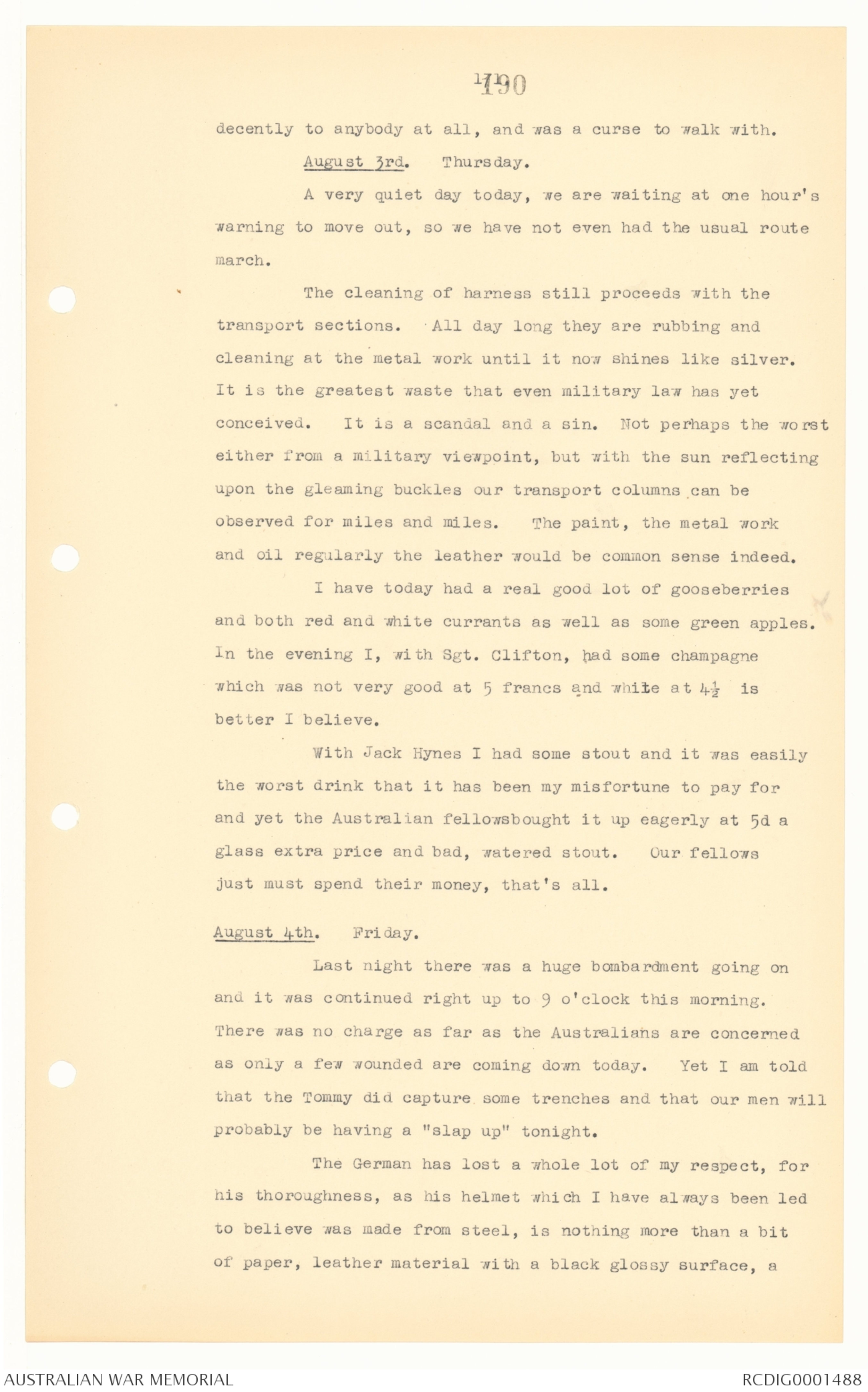
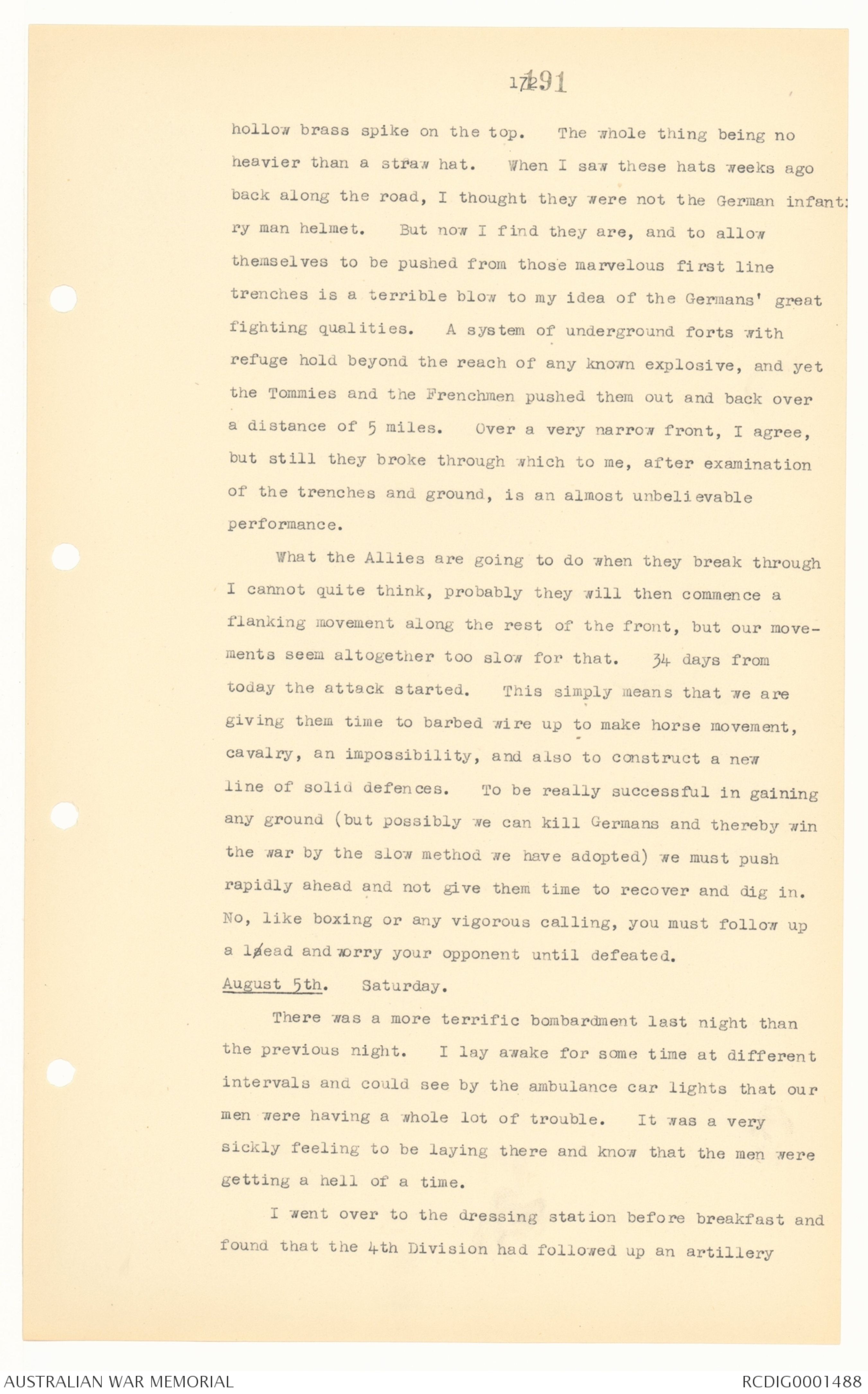
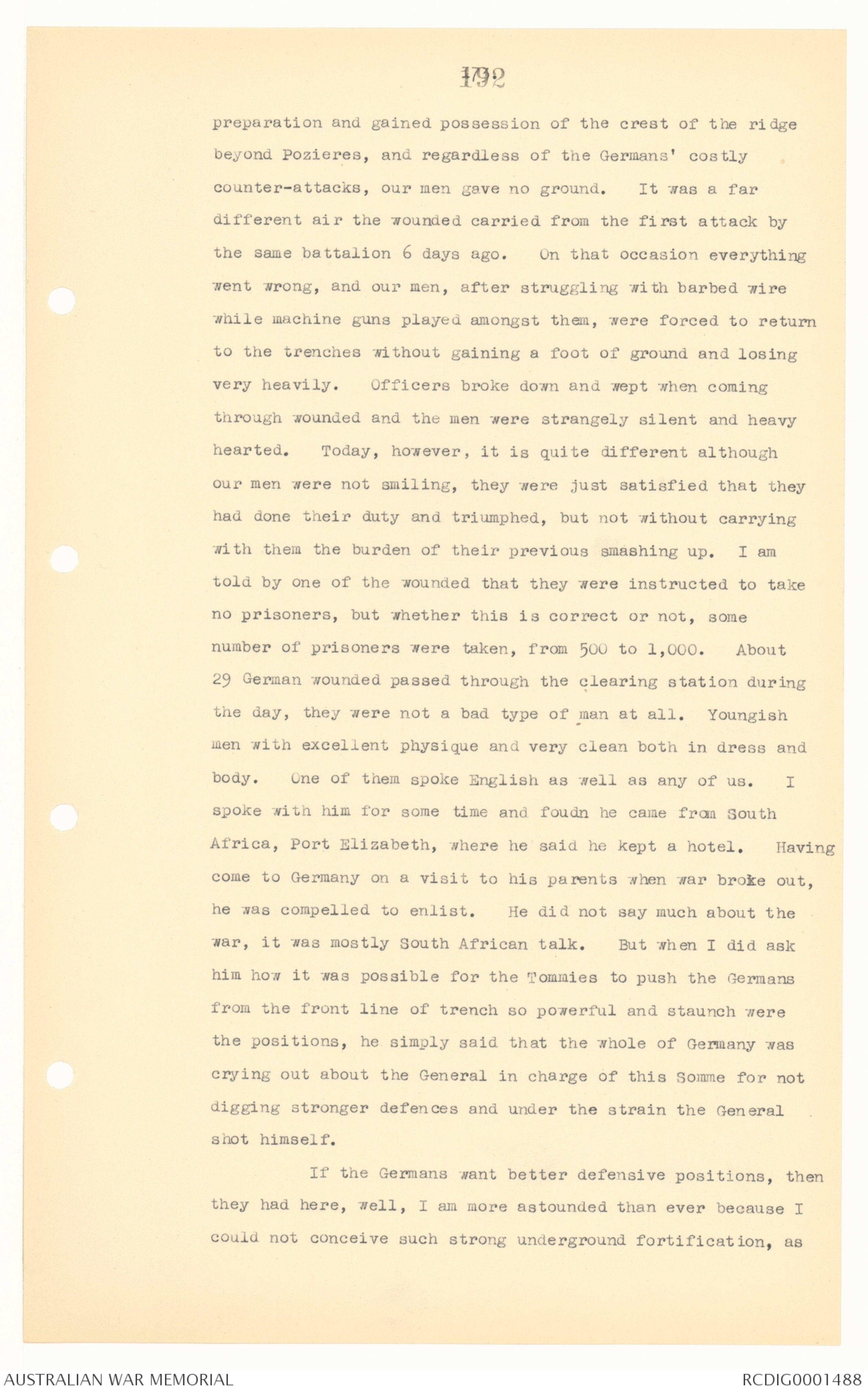
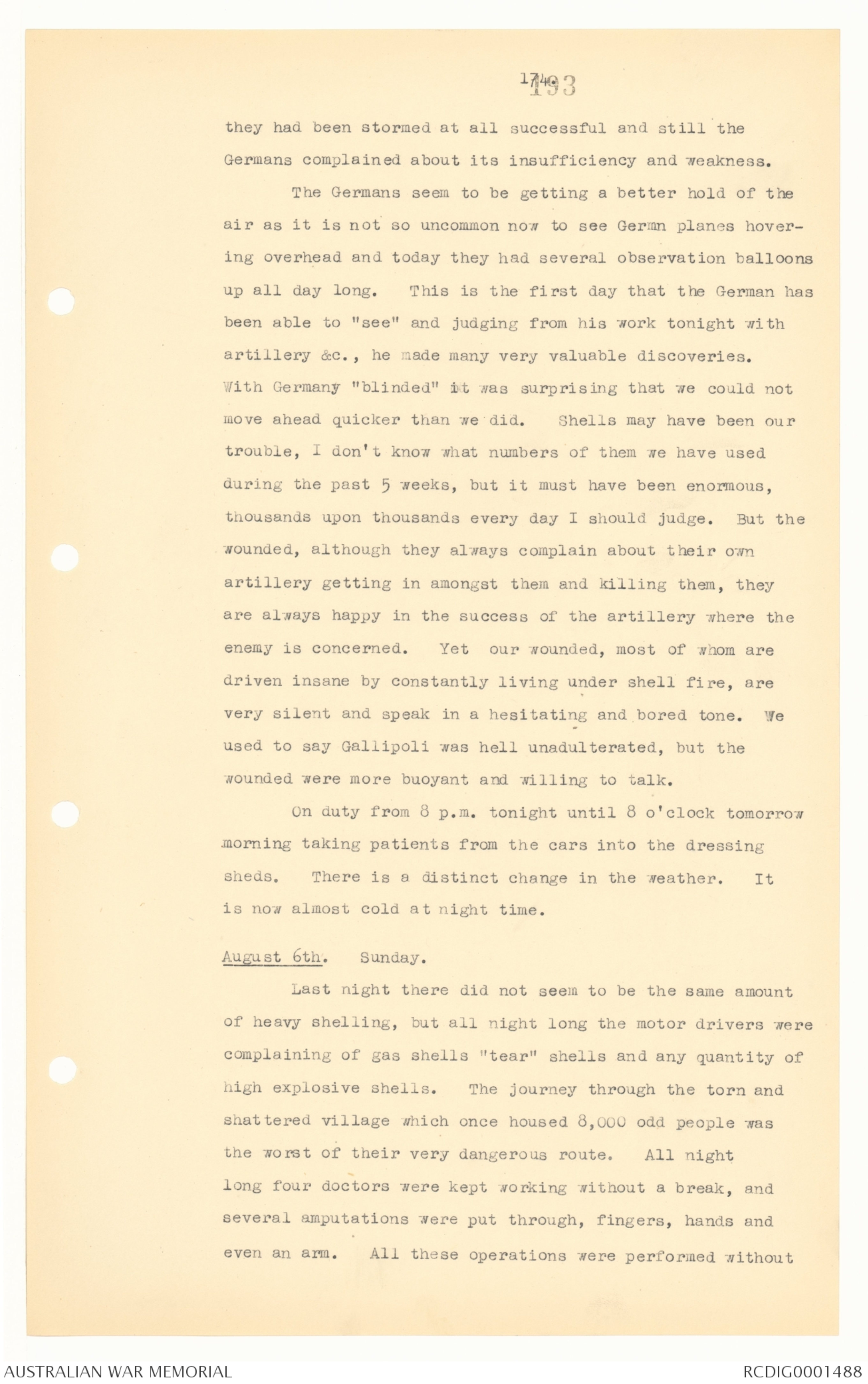
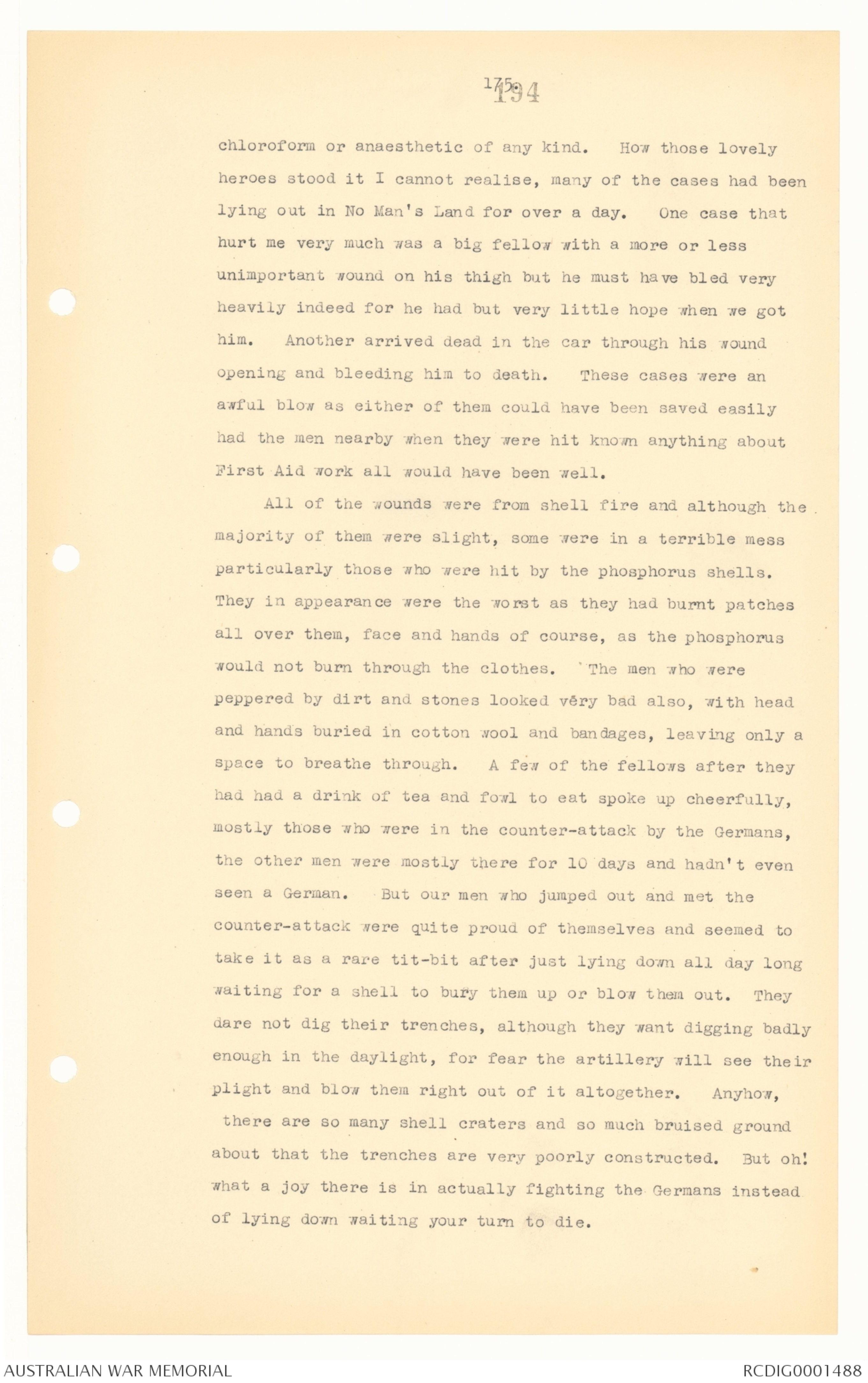
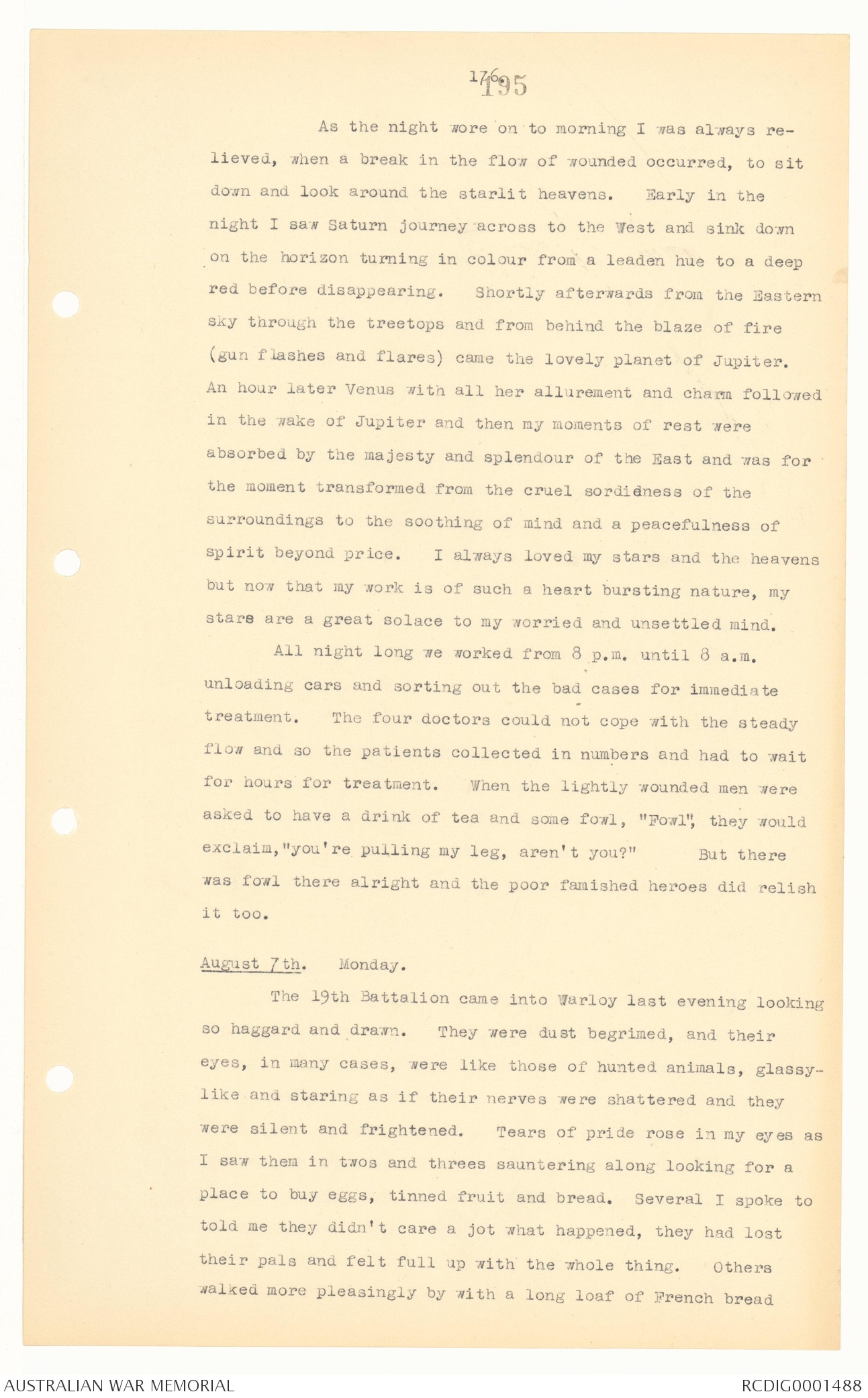
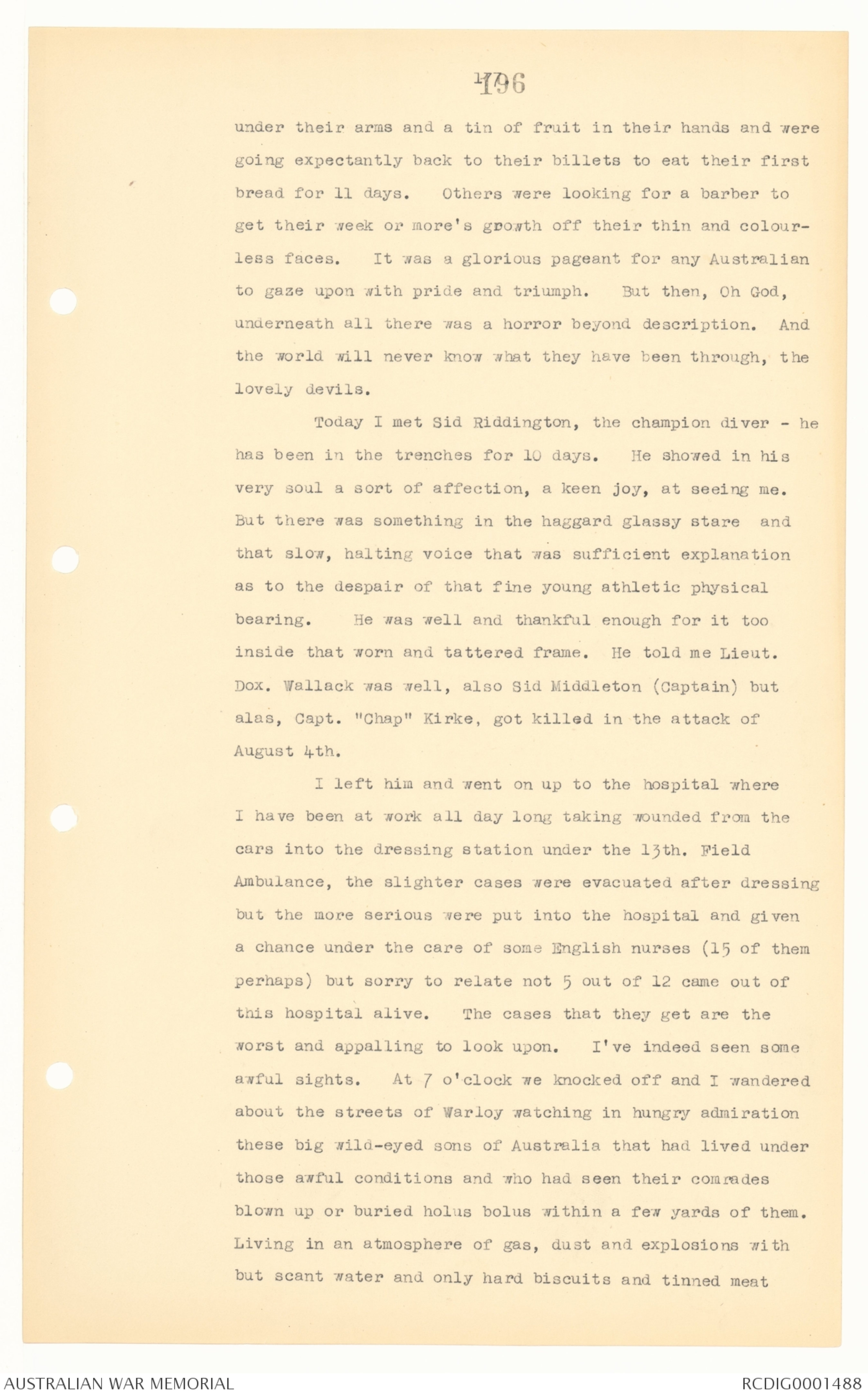
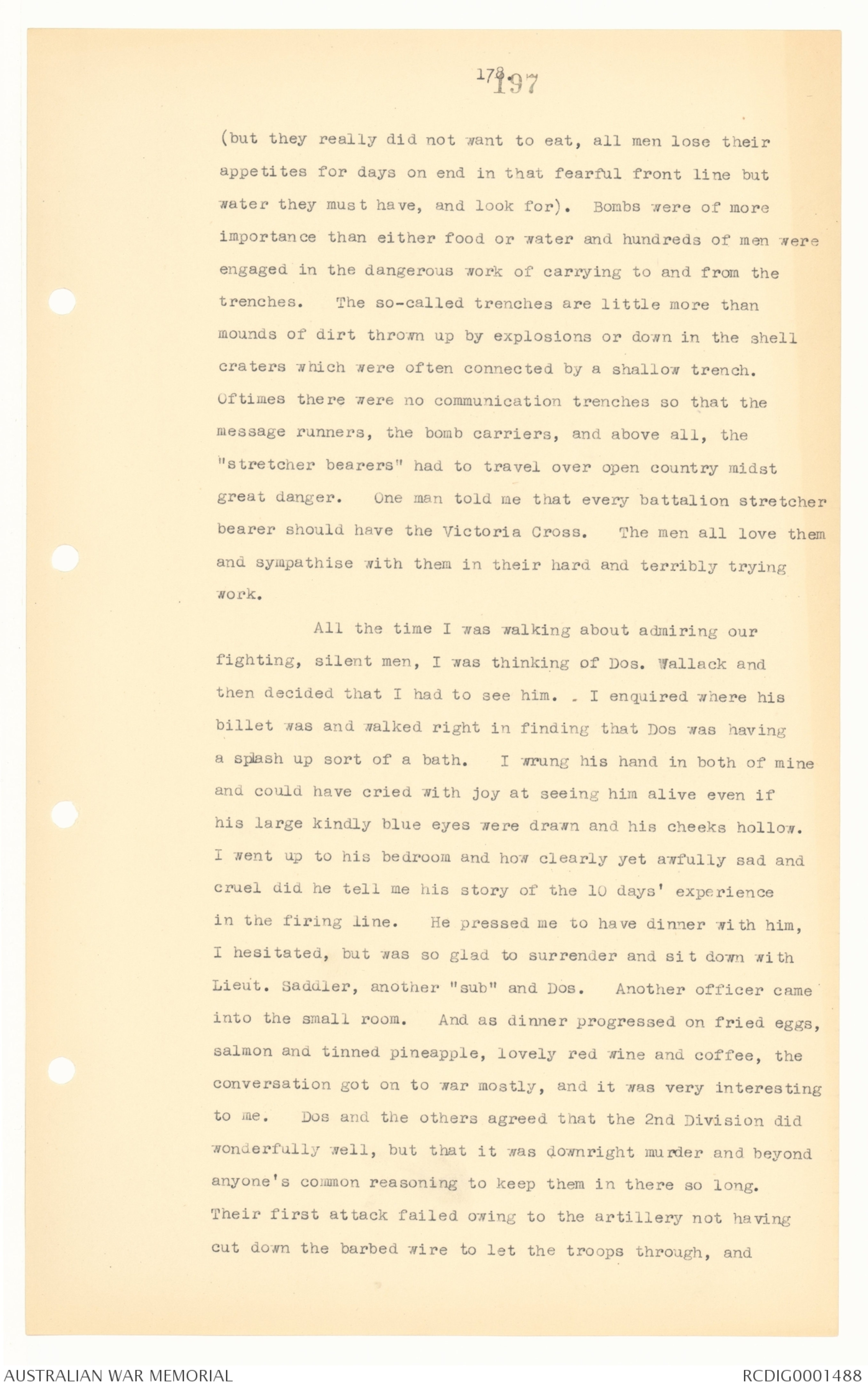
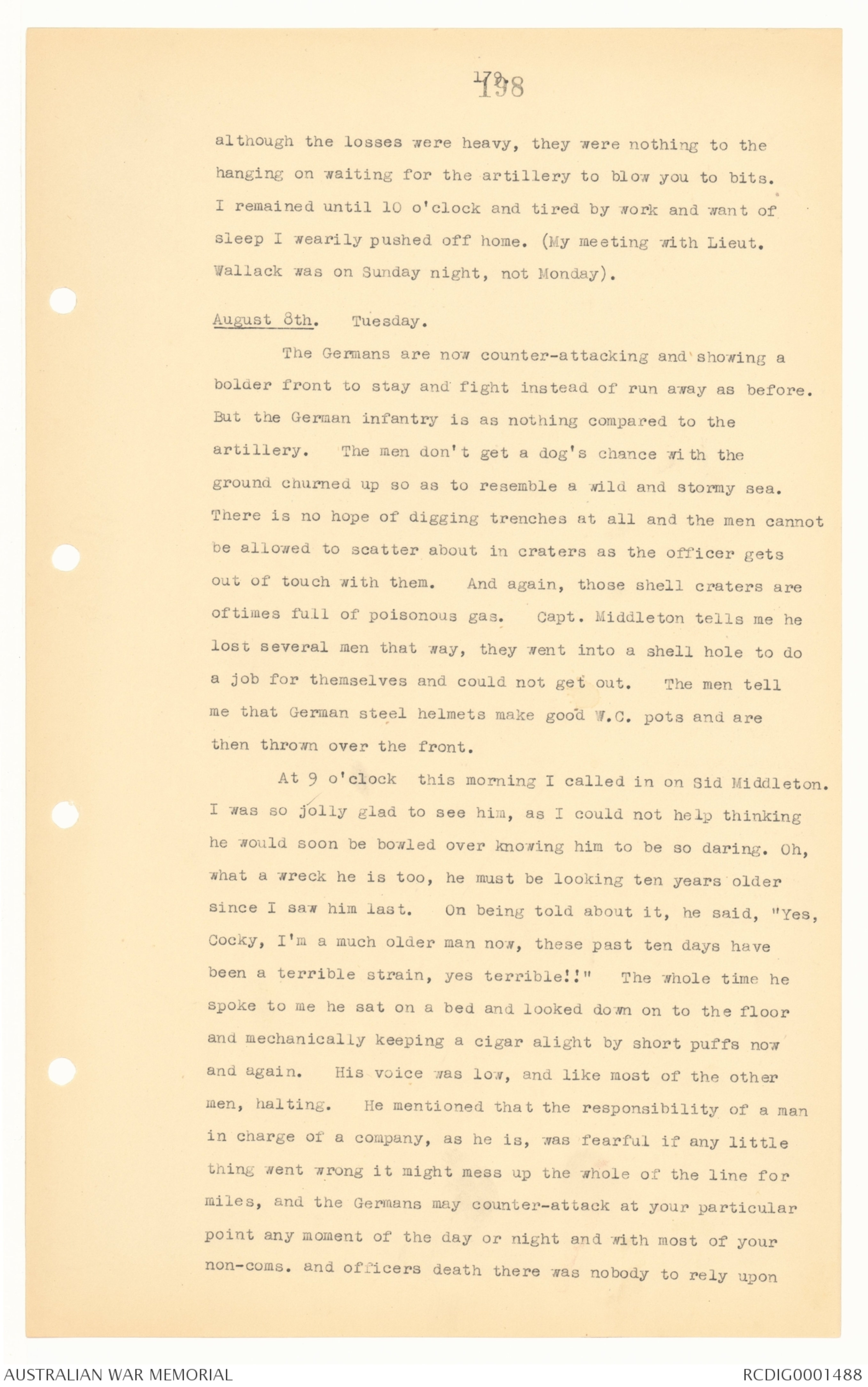
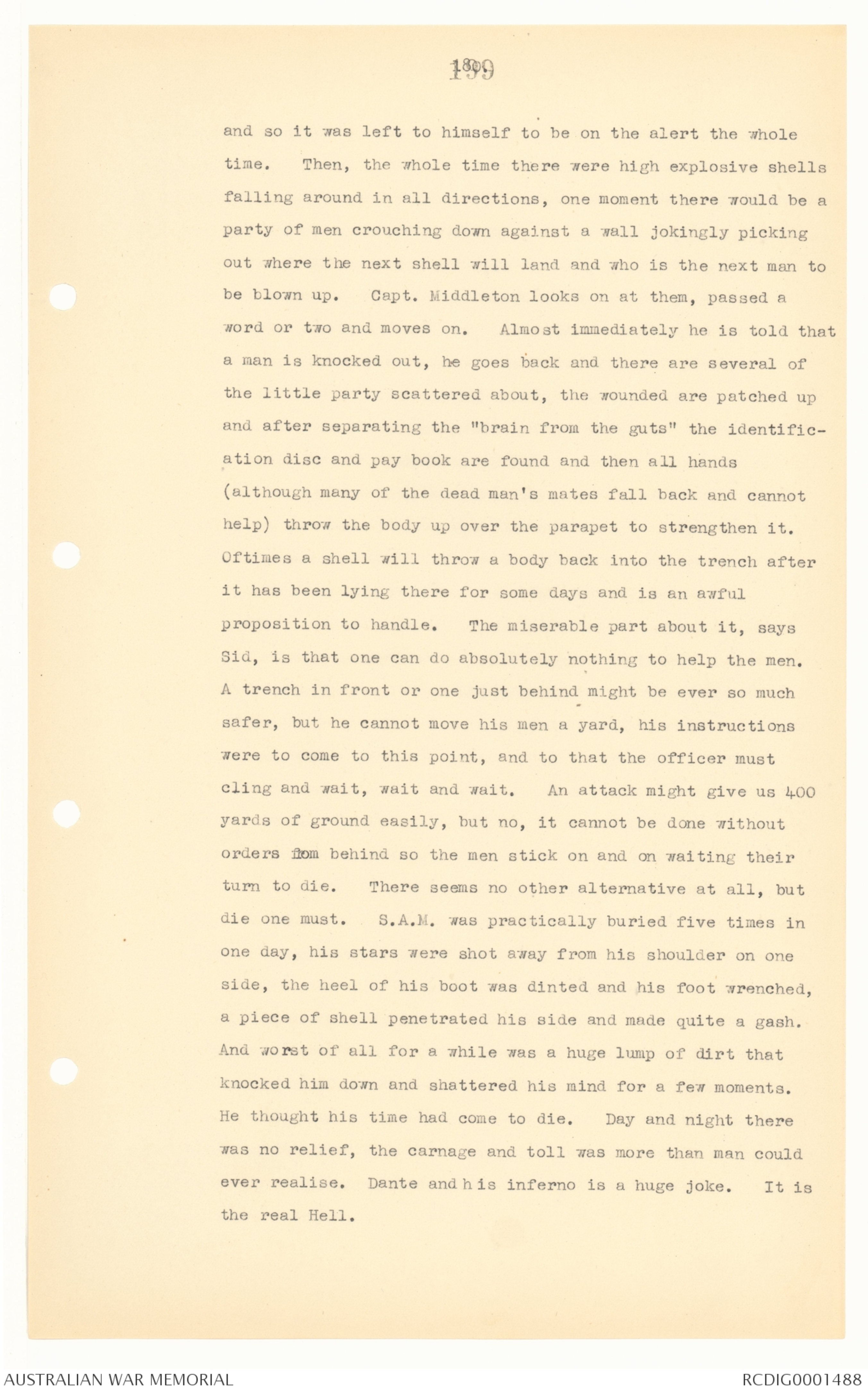
71
190
decently to anybody at all, and was a curse to walk with.
August 3rd. Thursday.
A very quiet day today, we are waiting at one hour's
warning to move out, so we have not even had the usual route
march.
The cleaning of harness still proceeds with the
transport sections. All day long they are rubbing and
cleaning at the metal work until it now shines like silver.
It is the greatest waste that even military law has yet
conceived. It is a scandal and a sin. Not perhaps the worst
either from a military viewpoint, but with the sun reflecting
upon the gleaming buckles our transport columns can be
observed for miles and miles. The paint, the metal work
and oil regularly the leather would be common sense indeed.
I have today had a real good lot of gooseberries
and both red and white currants as well as some green apples.
In the evening I, with Sgt. Clifton, had some champagne
which was not very good at 5 francs and white at 4½ is
better I believe.
With Jack Hynes I had some stout and it was easily
the worst drink that it has been my misfortune to pay for
and yet the Australian fellowsbought it up eagerly at 5d a
glass extra price and bad, watered stout. Our fellows
just must spend their money, that's all.
August 4th. Friday.
Last night there was a huge bombardment going on
and it was continued right up to 9 o'clock this morning.
There was no charge as far as the Australians are concerned
as only a few wounded are coming down today. Yet I am told
that the Tommy did capture some trenches and that our men will
probably be having a "slap up" tonight.
The German has lost a whole lot of my respect, for
his thoroughness, as his helmet which I have always been led
to believe was made from steel, is nothing more than a bit
of paper, leather material with a black glossy surface, a
172 191
hollow brass spike on the top. The whole thing being no
heavier than a straw hat. When I saw these hats weeks ago
back along the road, I thought they were not the German infantry
man helmet. But now I find they are, and to allow
themselves to be pushed from those marvelous first line
trenches is a terrible blow to my idea of the Germans' great
fighting qualities. A system of underground forts with
refuge hold beyond the reach of any known explosive, and yet
the Tommies and the Frenchmen pushed them out and back over
a distance of 5 miles. Over a very narrow front, I agree,
but still they broke through which to me, after examination
of the trenches and ground, is an almost unbelievable
performance.
What the Allies are going to do when they break through
I cannot quite think, probably they will then commence a
flanking movement along the rest of the front, but our movements
seem altogether too slow for that. 34 days from
today the attack started. This simply means that we are
giving them time to barbed wire up to make horse movement,
cavalry, an impossibility, and also to construct a new
line of solid defences. To be really successful in gaining
any ground (but possibly we can kill Germans and thereby win
the war by the slow method we have adopted) we must push
rapidly ahead and not give them time to recover and dig in.
No, like boxing or any vigorous calling, you must follow up
a laead and worry your opponent until defeated.
August 5th. Saturday.
There was a more terrific bombardment last night than
the previous night. I lay awake for some time at different
intervals and could see by the ambulance car lights that our
men were having a whole lot of trouble. It was a very
sickly feeling to be laying there and know that the men were
getting a hell of a time.
I went over to the dressing station before breakfast and
found that the 4th Division had followed up an artillery
173 192
preparation and gained possession of the crest of the ridge
beyond Pozieres, and regardless of the Germans' costly
counter-attacks, our men gave no ground. It was a far
different air the wounded carried from the first attack by
the same battalion 6 days ago. On that occasion everything
went wrong, and our men, after struggling with barbed wire
while machine guns played amongst them, were forced to return
to the trenches without gaining a foot of ground and losing
very heavily. Officers broke down and wept when coming
through wounded and the men were strangely silent and heavy
hearted. Today, however, it is quite different although
our men were not smiling, they were just satisfied that they
had done their duty and triumphed, but not without carrying
with them the burden of their previous smashing up. I am
told by one of the wounded that they were instructed to take
no prisoners, but whether this is correct or not, some
number of prisoners were taken, from 500 to 1,000. About
29 German wounded passed through the clearing station during
the day, they were not a bad type of man at all. Youngish
men with excellent physique and very clean both in dress and
body. One of them spoke English as well as any of us. I
spoke with him for some time and foudn he came from South
Africa, Port Elizabeth, where he said he kept a hotel. Having
come to Germany on a visit to his parents when war broke out,
he was compelled to enlist. He did not say much about the
war, it was mostly South African talk. But when I did ask
him how it was possible for the Tommies to push the Germans
from the front line of trench so powerful and staunch were
the positions, he simply said that the whole of Germany was
crying out about the General in charge of this Somme for not
digging stronger defences and under the strain the General
shot himself.
If the Germans want better defensive positions, then
they had here, well, I am more astounded than ever because I
could not conceive such strong underground fortification, as
174 193
they had been stormed at all successful and still the
Germans complained about its insufficiency and weakness.
The Germans seem to be getting a better hold of the
air as it is not so uncommon now to see Germn planes hovering
overhead and today they had several observation balloons
up all day long. This is the first day that the German has
been able to "see" and judging from his work tonight with
artillery &c., he made many very valuable discoveries.
With Germany "blinded" it was surprising that we could not
move ahead quicker than we did. Shells may have been our
trouble, I don't know what numbers of them we have used
during the past 5 weeks, but it must have been enormous,
thousands upon thousands every day I should judge. But the
wounded, although they always complain about their own
artillery getting in amongst them and killing them, they
are always happy in the success of the artillery where the
enemy is concerned. Yet, our wounded, most of whom are
driven insane by constantly living under shell fire, are
very silent and speak in a hesitating and bored tone. We
used to say Gallipoli was hell unadulterated, but the
wounded were more buoyant and willing to talk.
On duty from 8 p.m. tonight until 8 o'clock tomorrow
morning taking patients from the cars into the dressing
sheds. There is a distinct change in the weather. It
is now almost cold at night time.
August 6th. Sunday.
Last night there did not seem to be the same amount
of heavy shelling, but all night long the motor drivers were
complaining of gas shells "tear" shells and any quantity of
high explosive shells. The journey through the torn and
shattered village which once housed 8,000 odd people was
the worst of their very dangerous route. All night
long four doctors were kept working without a break, and
several amputations were put through, fingers, hands and
even an arm. All these operations were performed without
175 194
chloroform or anaesthetic of any kind. How those lovely
heroes stood it I cannot realise, many of the cases had been
lying out in No Man's Land for over a day. One case that
hurt me very much was a big fellow with a more or less
unimportant wound on his thigh but he must have bled very
heavily indeed for he had but very little hope when we got
him. Another arrived dead in the car through his wound
opening and bleeding him to death. These cases were an
awful blow as either of them could have been saved easily
had the men nearby when they were hit known anything about
First Aid work all would have been well.
All of the wounds were from shell fire and although the
majority of them were slight, some were in a terrible mess
particularly those who were hit by the phosphorus shells.
They in appearance were the worst as they had burnt patches
all over them, face and hands of course, as the phosphorus
would not burn through the clothes. The men who were
peppered by dirt and stones looked very bad also, with head
and hands buried in cotton wool and bandages, leaving only a
space to breathe through. A few of the fellows after they
had had a drink of tea and fowl to eat spoke up cheerfully,
mostly those who were in the counter-attack by the Germans,
the other men were mostly there for 10 days and hadn’t even
seen a German. But our men who jumped out and met the
counter-attack were quite proud of themselves and seemed to
take it as a rare tit-bit after just lying down all day long
waiting for a shell to bury them up or blow them out. They
dare not dig their trenches, although they want digging badly
enough in the daylight, for fear the artillery will see their
plight and blow them right out of it altogether. Anyhow,
there are so many shell craters and so much bruised ground
about that the trenches are very poorly constructed. But oh!
what a joy there is in actually fighting the Germans instead
of lying down waiting your turn to die.
176 195
As the night wore on to morning I was always relieved,
when a break in the flow of wounded occurred, to sit
down and look around the starlit heavens. Early in the
night I saw Saturn journey across to the West and sink down
on the horizon turning in colour from a leaden hue to a deep
red before disappearing. Shortly afterwards from the Eastern
sky through the treetops and from behind the blaze of fire
(gun flashes and flares) came the lovely planet of Jupiter.
An hour later Venus with all her allurement and charm followed
in the wake of Jupiter and then my moments of rest were
absorbed by the majesty and splendour of the East and was for
the moment transformed from the cruel sordidness of the
surroundings to the soothing of mind and a peacefulness of
spirit beyond price. I always loved my stars and the heavens
but now that my work is of such a heart bursting nature, my
stars are a great solace to my worried and unsettled mind.
All night long we worked from 8 p.m. until 8 a.m.
unloading cars and sorting out the bad cases for immediate
treatment. The four doctors could not cope with the steady
flow and so the patients collected in numbers and had to wait
for hours for treatment. When the lightly wounded men were
asked to have a drink of tea and some fowl, "Fowl", they would
exclaim, "you're pulling my leg, aren't you?" But there
was fowl there alright and the poor famished heroes did relish
it too.
August 7th. Monday.
The 19th Battalion came into Warloy last evening looking
so haggard and drawn. They were dust begrimed, and their
eyes, in many cases, were like those of hunted animals, glassy-like
and staring as if their nerves were shattered and they
were silent and frightened. Tears of pride rose in my eyes as
I saw them in twos and threes sauntering along looking for a
place to buy eggs, tinned fruit and bread. Several I spoke to
told me they didn't care a jot what happened, they had lost
their pals and felt full up with the whole thing. Others
walked more pleasingly by with a long loaf of French bread
177 196
under their arms and a tin of fruit in their hands and were
going expectantly back to their billets to eat their first
bread for 11 days. Others were looking for a barber to
get their week or more's growth off their thin and colourless
faces. It was a glorious pageant for any Australian
to gaze upon with pride and triumph. But then, Oh God,
underneath all there was a horror beyond description. And
the world will never know what they have been through, the
lovely devils.
Today I met Sid Riddington, the champion diver - he
has been in the trenches for 10 days. He showed in his
very soul a sort of affection, a keen joy, at seeing me.
But there was something in the haggard glassy stare and
that slow, halting voice that was sufficient explanation
as to the despair of that fine young athletic physical
bearing. He was well and thankful enough for it too
inside that worn and tattered frame. He told me Lieut.
Dox. Wallack was well, also Sid Middleton (Captain) but
alas, Capt. "Chap" Kirke, got killed in the attack of
August 4th.
I left him and went on up to the hospital where
I have been at work all day long taking wounded from the
cars into the dressing station under the 13th. Field
Ambulance, the slighter cases were evacuated after dressing
but the more serious were put into the hospital and given
a chance under the care of some English nurses (15 of them
perhaps) but sorry to relate not 5 out of 12 came out of
this hospital alive. The cases that they get are the
worst and appalling to look upon. I've indeed seen some
awful sights. At 7 o'clock we knocked off and I wandered
about the streets of Warloy watching in hungry admiration
these big wild-eyed sons of Australia that had lived under
those awful conditions and who had seen their comrades
blown up or buried holus bolus within a few yards of them.
Living in an atmosphere of gas, dust and explosions with
but scant water and only hard biscuits and tinned meat
178 197
(but they really did not want to eat, all men lose their
appetites for days on end in that fearful front line but
water they must have, and look for). Bombs were of more
importance than either food or water and hundreds of men were
engaged in the dangerous work of carrying to and from the
trenches. The so-called trenches are little more than
mounds of dirt thrown up by explosions or down in the shell
craters which were often connected by a shallow trench.
Of times there were no communication trenches so that the
message runners, the bomb carriers, and above all, the
"stretcher bearers" had to travel over open country midst
great danger. One man told me that every battalion stretcher
bearer should have the Victoria Cross. The men all love them
and sympathise with them in their hard and terribly trying
work.
All the time I was walking about admiring our
fighting, silent men, I was thinking of Dos. Wallack and
then decided that I had to see him. I enquired where his
billet was and walked right in finding that Dos was having
a splash up sort of a bath. I wrung his hand in both of mine
and could have cried with joy at seeing him alive even if
his large kindly blue eyes were drawn and his cheeks hollow.
I went up to his bedroom and how clearly yet awfully sad and
cruel did he tell me his story of the 10 days' experience
in the firing line. He pressed me to have dinner with him,
I hesitated, but was so glad to surrender and sit down with
Lieut. Saddler, another "sub" and Dos. Another officer came
into the small room. And as dinner progressed on fried eggs,
salmon and tinned pineapple, lovely red wine and coffee, the
conversation got on to war mostly, and it was very interesting
to me. Dos and the others agreed that the 2nd Division did
wonderfully well, but that it was downright murder and beyond
anyone's common reasoning to keep them in there so long.
Their first attack failed owing to the artillery not having
cut down the barbed wire to let the troops through, and
179 198
although the losses were heavy, they were nothing to the
hanging on waiting for the artillery to blow you to bits.
I remained until 10 o'clock and tired by work and want of
sleep I wearily pushed off home. (My meeting with Lieut.
Wallack was on Sunday night, not Monday).
August 8th. Tuesday.
The Germans are now counter-attacking and showing a
bolder front to stay and fight instead of run away as before.
But the German infantry is as nothing compared to the
artillery. The men don't get a dog's chance with the
ground churned up so as to resemble a wild and stormy sea.
There is no hope of digging trenches at all and the men cannot
be allowed to scatter about in craters as the officer gets
out of touch with them. And again, those shell craters are
oftimes full of poisonous gas. Capt. Middleton tells me he
lost several men that way, they went into a shell hole to do
a job for themselves and could not get out. The men tell
me that German steel helmets make good W.C. pots and are
then thrown over the front.
At 9 o'clock, this morning I called in on Sid Middleton.
I was so jolly glad to see him, as I could not help thinking
he would soon be bowled over knowing him to be so daring. Oh,
what a wreck he is too, he must be looking ten years older
since I saw him last. On being told about it, he said, "Yes,
Cocky, I'm a much older man now, these past ten days have
been a terrible strain, yes terrible!!" The whole time he
spoke to me he sat on a bed and looked down on to the floor
and mechanically keeping a cigar alight by short puffs now
and again. His voice was low, and like most of the other
men, halting. He mentioned that the responsibility of a man
in charge of a company, as he is, was fearful if any little
thing went wrong it might mess up the whole of the line for
miles, and the Germans may counter-attack at your particular
point any moment of the day or night and with most of your
non-coms, and officers death there was nobody to rely upon
180. 199
and so it was left to himself to be on the alert the whole
time. Then, the whole time there were high explosive shells
falling around in all directions, one moment there would be a
party of men crouching down against a wall jokingly picking
out where the next shell will land and who is the next man to
be blown up. Capt. Middleton looks on at them, passed a
word or two and moves on. Almost immediately he is told that
a man is knocked out, he goes back and there are several of
the little party scattered about, the wounded are patched up
and after separating the "brain from the guts" the identification
disc and pay book are found and then all hands
(although many of the dead man's mates fall back and cannot
help) throw the body up over the parapet to strengthen it.
Oftimes a shell will throw a body back into the trench after
it has been lying there for some days and is an awful
proposition to handle. The miserable part about it, says
Sid, is that one can do absolutely nothing to help the men.
A trench in front or one just behind might be ever so much
safer, but he cannot move his men a yard, his instructions
were to come to this point, and to that the officer must
cling and wait, wait and wait. An attack might give us 400
yards of ground easily, but no, it cannot be done without
orders from behind so the men stick on and on waiting their
turn to die. There seems no other alternative at all, but
die one must. S.A.M. was practically buried five times in
one day, his stars were shot away from his shoulder on one
side, the heel of his boot was dinted and his foot wrenched,
a piece of shell penetrated his side and made quite a gash.
And worst of all for a while was a huge lump of dirt that
knocked him down and shattered his mind for a few moments.
He thought his time had come to die. Day and night there
was no relief, the carnage and toll was more than man could
ever realise. Dante and his inferno is a huge joke. It is
the real Hell.
 Sam scott
Sam scottThis transcription item is now locked to you for editing. To release the lock either Save your changes or Cancel.
This lock will be automatically released after 60 minutes of inactivity.